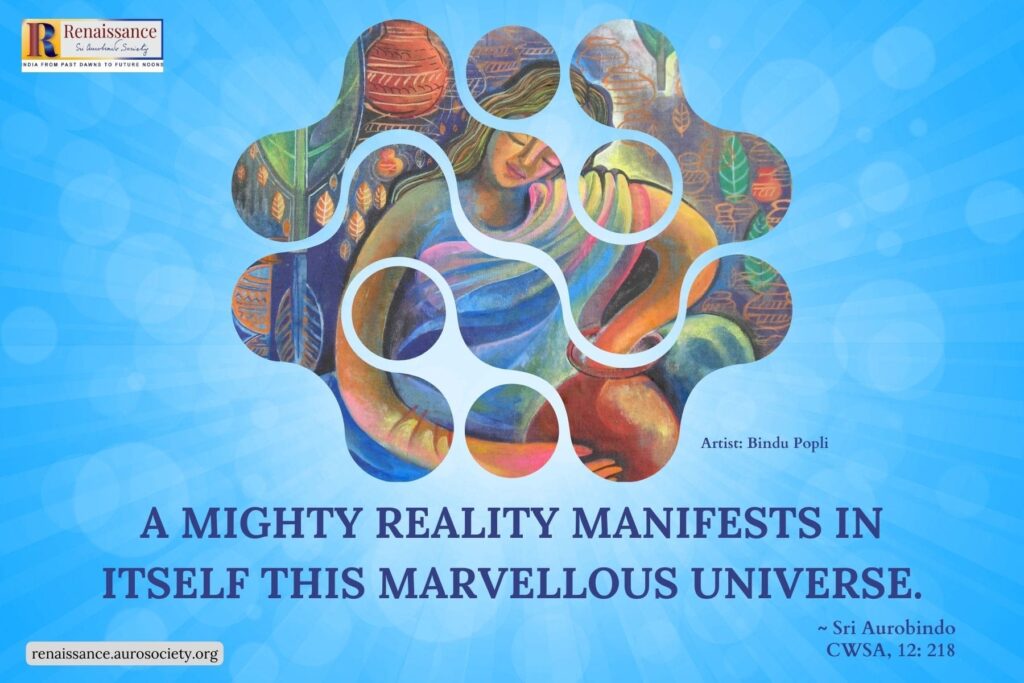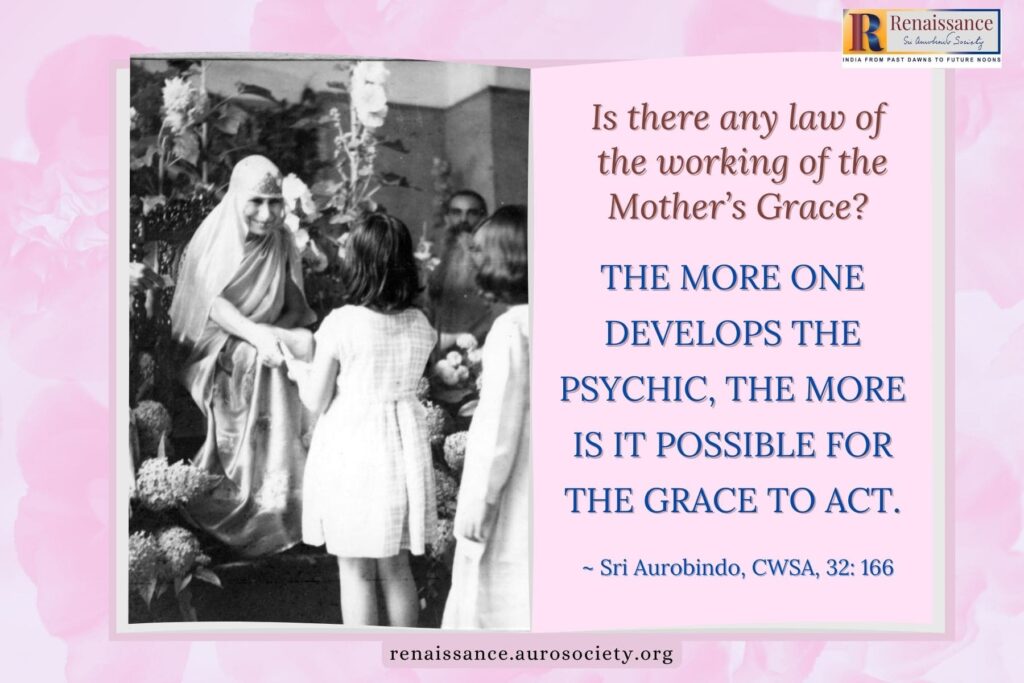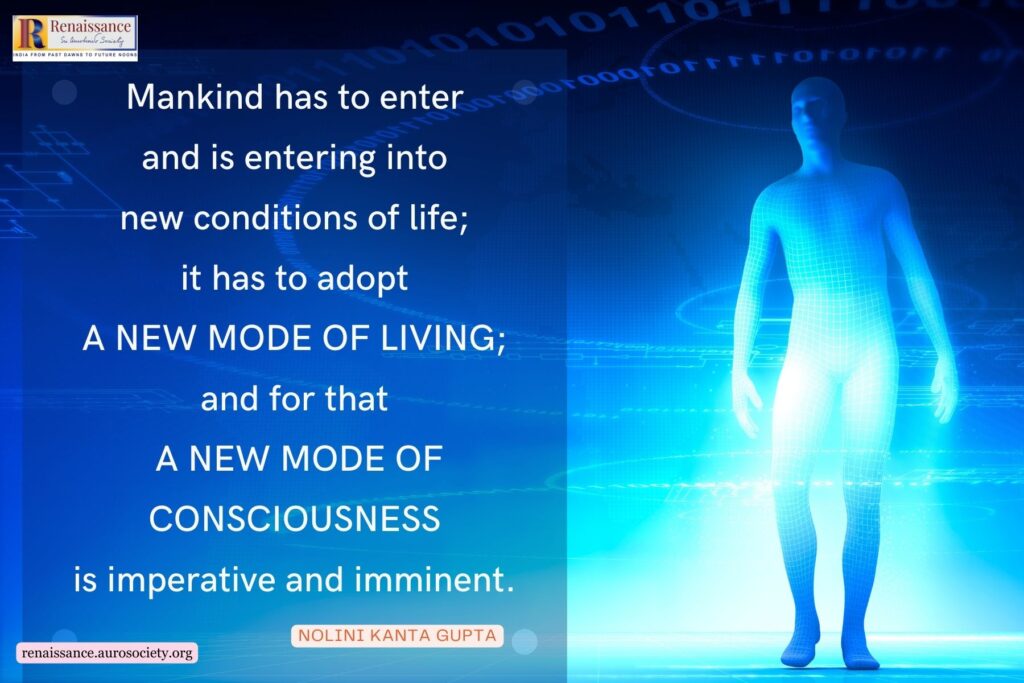Editor’s note: We highlight some selections from three volumes of the Mother’s works in our Guiding Light feature. Emphasising that the earth is a field for progress, she helps us understand that while one inevitably makes progress with the rhythm of Nature, with sadhana this progress can become conscious and swift. The Mother also reminds us that we are incapable of judging our own progress; our attitude should rather be to constantly strive for progress for the joy of it and all our effort should be a spontaneous act of offering to the Divine with full trust in Him.
For easier online readability, headings and sub-headings have been added by the editors.

Earthly Life is Essentially the Life of Progress
We are upon earth; the period one passes on earth is that in which one can make progress. One does not progress outside terrestrial life. The earthly, material life is essentially the life of progress, it is here that one makes progress. Outside the earthly life one takes rest or is unconscious or one may have periods of assimilation, periods of rest, periods of unconsciousness. But as for the periods of progress, they are on the earth and in the body. So, when you take a body it is to make progress, and when you leave it the period of progress is over.
And true progress is sadhana; that is, it is the most conscious and swiftest progress. Otherwise one makes progress with the rhythm of Nature, which means that it can take centuries and centuries and centuries and millenniums to make the slightest bit of progress. But true progress is that made by sadhana.
In yoga one can do in a very short time what takes otherwise an interminable time. But it is always in the body and always upon earth that it is done, not elsewhere. That is why when one is in a body one must take advantage of it and not waste one’s time, not say, “A little later, a little later.” It is much better to do it immediately. All the years you pass without making any progress are wasted years which you are sure to regret afterwards.
~ The Mother, CWM, Vol. 7, p. 33
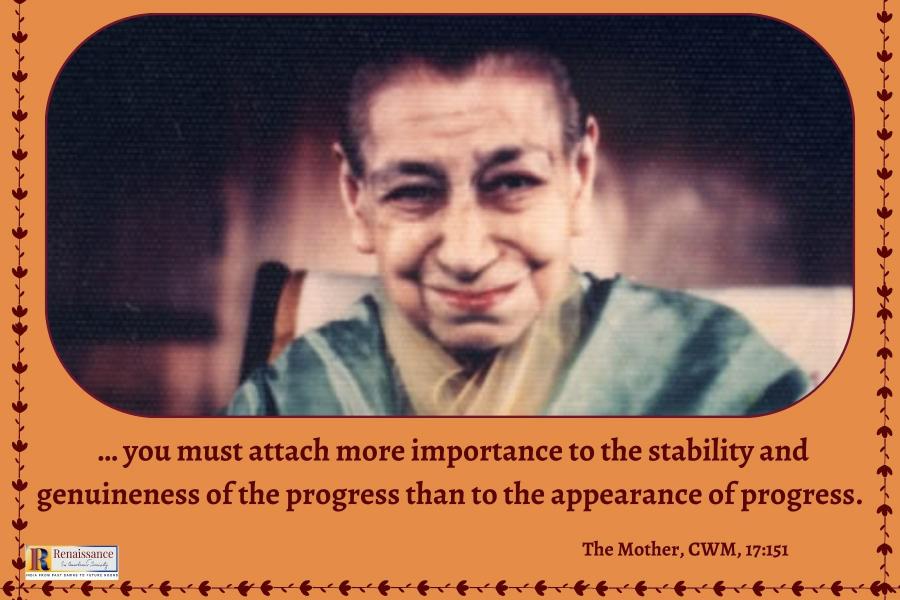

Clinging to Past Experience Slows Down the Advance
One can never have the same experience twice because one is never the same person twice. Between the first experience and the second, even if one hour has passed, you are no longer the same man and you can never reproduce identically the same thing. If you take care to become more conscious, more sincere, more concentrated, the experience you have will be different, but it may be deeper and more clear.
But if you cling to something you have had and want to reproduce the same thing, you will have nothing at all, because you can’t have the same thing and you are in a state in which you refuse to have a new experience, for you are attached to the past one.
And usually when one has had an experience which was a revelation, something altogether important, one doesn’t want to leave it, one is afraid of not having it any longer, and so, in this movement of clinging to something, one prevents oneself from progressing and puts oneself in conditions in which one can’t have the next experience. […]
But the more ready you are to leave behind all that you have experienced, in order to be able to go towards something better and higher, the faster you will go; the more you drag the heavy weight of all the past which you don’t want to get rid of, the slower is your advance.
“Always Go Forward, Advance, Advance”
All the past should always be simply like a stepping-stone or a ladder, something to lead you farther; it should not have any other use except to push you forward. And if you can feel this and always turn your back on what is past and look at what you want to do, then you go much faster, you don’t waste time on the way.
What makes you lose time is always this clinging to what has been, to what is, what seemed to you beautiful and good in what is past. This must only help you, you must not reject it, but it must help you to go forward, it must simply be something on which you lean to take a step forward.
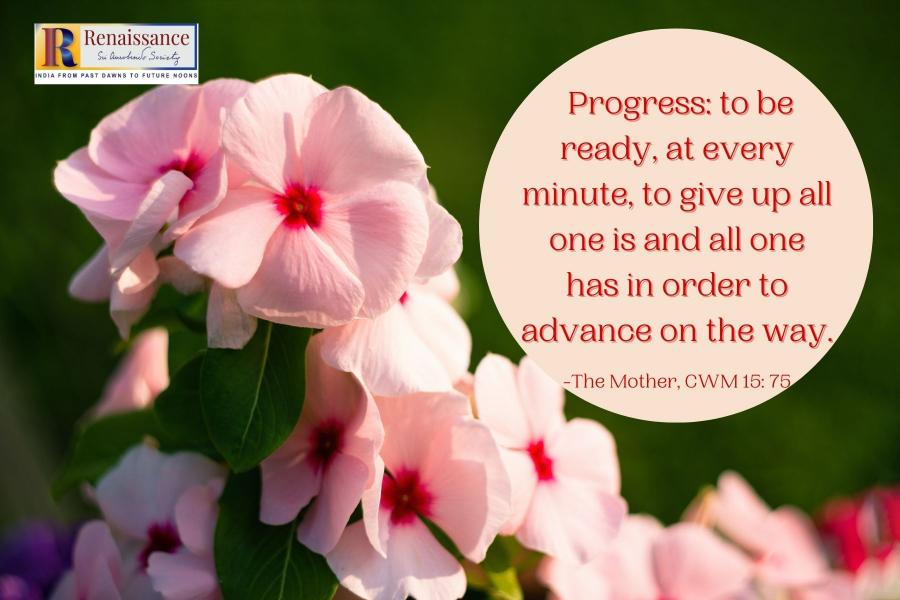
Now, at a particular time, a set of circumstances, inner and outer, has caused one to be receptive to a certain vibration; for example, as you say, while looking at the stars or contemplating a landscape or reading a page or hearing a lecture, one has suddenly an inner revelation, an experience, something that strikes him and gives him the impression of being open to something new.
But if you want to hold on to this tightly like that, you will lose everything, because one can’t keep the past, one must always go forward, advance, advance. This illumination must prepare you so that you can organise your whole being on this new level, in order to be able suddenly, one day, to leap up again to a higher step.
Horizontal And Vertical Progress
There is a horizontal advance between abrupt ascents. It is the moment of the abrupt ascent which gives you an impression of something like a revelation, a great inner joy. But once you have climbed the step, if you want to climb it once more you would have to go down again. You must go on preparing yourself at this level in order to climb another higher step. These things which suddenly give you a great joy are always ascents.
But these ascents are prepared by a slow work of horizontal progress, that is, one must become more and more conscious, establish more and more perfectly what one is, draw from it all the inner, psychological consequences, and in action also. It is a long utilisation of an abrupt leap and, as I say, there are two kinds of progress. But the horizontal progress is indispensable.
You must not stop, you must not cling in this way to your vertical progress and not want to move because it has brought you a revelation. You must know how to leave it in order to prepare for another.
~ The Mother, CWM, Vol. 5, pp. 34-36
Also see:
Ancient Hindu Cyclical Theory of Evolution

Never Be Discouraged
Disciple: Sweet Mother, when we make an effort to do better but don’t see any progress, we feel discouraged. What is the best thing to do?
Not to be discouraged! Despondency leads nowhere.
To begin with, the first thing to tell yourself is that you are almost entirely incapable of knowing whether you are making progress or not, for very often what seems to us to be a state of stagnation is a long—sometimes long, but in any case not endless—preparation for a leap forward.
We sometimes seem to be marking time for weeks or months, and then suddenly something that was being prepared makes its appearance, and we see that there is quite a considerable change and on several points at a time.
As with everything in yoga, the effort for progress must be made for the love of the effort for progress. The joy of effort, the aspiration for progress must be enough in themselves, quite independent of the result.
Everything one does in yoga must be done for the joy of doing it, and not in view of the result one wants to obtain . . . Indeed, in life, always, in all things, the result does not belong to us. And if we want to keep the right attitude, we must act, feel, think, strive spontaneously, for that is what we must do, and not in view of the result to be obtained.
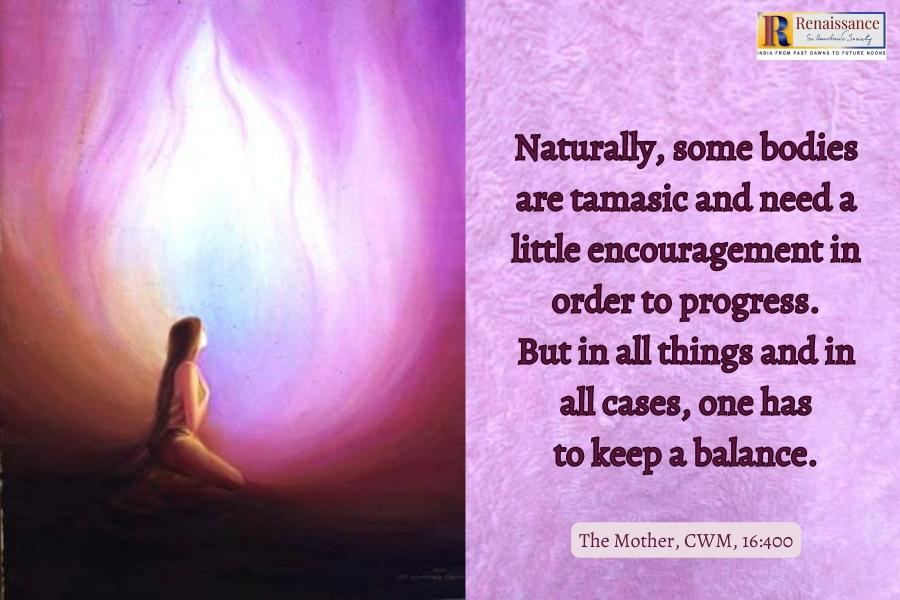
Do Not Bargain with the Divine
As soon as we think of the result we begin to bargain and that takes away all sincerity from the effort. You make an effort to progress because you feel within you the need, the imperative need to make an effort and progress; and this effort is the gift you offer to the Divine Consciousness in you, the Divine Consciousness in the Universe, it is your way of expressing your gratitude, offering your self; and whether this results in progress or not is of no importance. You will progress when it is decided that the time has come to progress and not because you desire it.
If you wish to progress, if you make an effort to control yourself for instance, to overcome certain defects, weaknesses, imperfections, and if you expect to get a more or less immediate result from your effort, your effort loses all sincerity, it becomes a bargaining. You say, “See! I am going to make an effort, but that’s because I want this in exchange for my effort.” You are no longer spontaneous, no longer natural.
Also read:
Are you bored? – Time to ask yourself if you are progressing?
Two Things to Remember
So there are two things to remember. First, we are incapable of judging what the result ought to be. If we put our trust in the Divine, if we say… if we say, “Well now, I am going to give everything, everything, all I can give, effort, concentration, and He will judge what has to be given in exchange or even whether anything should be given in exchange, and I do not know what the result should be.”
Before we transform anything in ourselves, are we quite sure of the direction, the way, the form that this transformation should take?—Not at all. So, it is only our imagination and usually we greatly limit the result to be obtained and make it altogether petty, mean, superficial, relative.
We do not know what the result can truly be, what it ought to be. We know it later. When it comes, when the change takes place, then if we look back, we say, “Ah! That’s it, that is what I was moving towards”—but we know it only later. Before that we only have vague imaginations which are quite superficial and childish in comparison with the true progress, the true transformation.
So we say, first point: we have an aspiration but we don’t really know the true result we ought to obtain. Only the Divine can know that.
And secondly, if we tell the Divine, “I am giving you my effort, but, you know, in exchange I must make progress, otherwise I won’t give you anything at all!”—that is bargaining. That’s all.
(Silence)
A spontaneous act, done because one cannot do otherwise, and done as an offering of goodwill, is the only one which truly has any value.
~ The Mother, CWM, Vol. 9, pp. 316-318

~ Design: Biswajita Mohapatra

